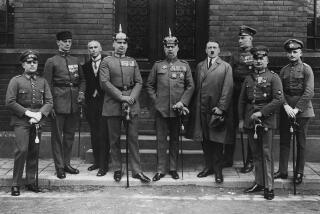A German Couple Who Gave All to Fight Nazism
Former German chancellor Willy Brandt, who himself had fled his native land to fight Nazism, defined a resister as someone who “takes serious risks to act illegally in a world where right has become wrong.” While it is never easy, as Shelley put it, “to defy Power, which seems omnipotent,” to do so under Hitler’s totalitarian regime took courage of an incredible kind. The number of Germans who dared--or even cared--to take such risks was regrettably small, but the admiration their acts compel is--or should be--immense.
Resisters came from many walks of life: students, professors, generals, civil servants, workers and clergymen; Protestants, Catholics, atheists, Jews; socialists, communists, conservatives and monarchists. In her riveting biography of Mildred Harnack, an American-born woman executed by the Nazis in 1943, Shareen Blair Brysac presents the story of a heroine who failed to receive her posthumous due in the West because of her communist affiliations.
A Midwesterner of Yankee stock, Harnack, nee Fish, grew up in Milwaukee, a beautiful, serious young woman who loved Whitman, Emerson and Goethe. Her political views were Wisconsin-style progressive. At the University of Wisconsin, she met Arvid von Harnack, scion of a distinguished family of German academics, friends and relations by intermarriage of the Delbrucks, the Bonhoeffers and the Dohnanyis, many of whom would be killed for opposing Hitler.
Mildred and Arvid married in 1926 and returned to Germany in 1929, where Mildred found work as a teacher and a translator. Arvid would eventually hold a position in the Economics Ministry, which gave him access to vital information. At first, neither Mildred nor Arvid embraced communism. A letter Mildred wrote her mother in 1930, in the wake of the Nazis’ election gains, reveals her political attitude at that time: “The group calls itself the National Socialists although it has nothing to do with socialism and the name itself is a lie. It thinks itself highly moral and like the Ku Klux Klan makes a campaign of hatred against the Jews. The existence of this group, as well as the smaller one of the Communists, whose aims are finer, endangers the government in Germany. Neither group wishes to work through the Reichstag although both sit in it.”
But as German democratic institutions crumbled and democratic nations like Britain, France and the U.S. seemed unwilling to counter the Nazi threat, the Harnacks turned to communism. Arvid had long been an advocate of socialist economic ideas such as central planning. When faced with evidence that Russia was far from paradise, he rationalized that communism would be more successful in a highly developed country like Germany. Although the Harnacks provided information to the Soviets, they saw themselves primarily as resisters, not spies, and also passed secrets to American intelligence.
Drawing on a variety of primary sources, including letters, personal interviews with those who knew them and recently declassified CIA and KGB files, Brysac fleshes out a vivid picture of the Harnacks and the turbulent times in which they lived, from the intellectual and cultural ferment of the Weimar Republic to the constricted and hypocritical atmosphere of the Nazi dictatorship. In addition to colorful portraits of the Harnacks and their circle, Brysac provides a lucid account of the workings of the so-called Red Orchestra, the Nazis’ name for the clandestine network that provided information to the Soviets by coded transmissions on hidden radios. We also learn many heart-rending details of the Harnacks’ imprisonment, trials and deaths, his by being hanged from a meat hook, hers by the more humane method of the guillotine. “Despite everything,” wrote Arvid to Mildred shortly before his death, “I look back gladly on my life. The darkness was outweighed by the light. And this is largely because of our marriage. . . . Our intense work meant life was not easy for us, and the danger of being overwhelmed not slight. Nonetheless, we remained living human beings.” The last words Mildred spoke prior to her execution affirmed her conviction that working against an immoral regime was an act of true patriotism: “And I have loved Germany so much.”
“The rope and blade / Are not the final arguments / And our judges today / Are not the Last Judgment.” Brysac cites these lines from a poem by the Harnacks’ comrade Harro Schulze-Boysen that was later found jammed in the floorboards of his cell. Her well-researched, fair-minded and moving account of the Harnacks and their fate should go a long way toward restoring the reputations of these idealistic and heroic resisters.
More to Read
Sign up for Essential California
The most important California stories and recommendations in your inbox every morning.
You may occasionally receive promotional content from the Los Angeles Times.










